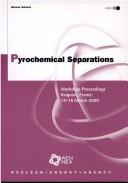| Listing 1 - 2 of 2 |
Sort by
|

ISBN: 1280034289 9786610034284 9264189734 9789264189737 9264184430 Year: 2001 Publisher: Paris : OECD Publishing,
Abstract | Keywords | Export | Availability | Bookmark
 Loading...
Loading...Choose an application
- Reference Manager
- EndNote
- RefWorks (Direct export to RefWorks)
The industrial treatment of spent nuclear fuel is presently performed using different wet chemical processes. Alternative dry processes, using pyrochemical methods, have received some attention due to their potential advantages in terms of plant design and criticality safety, as well as radiation dose. Recent progress in the transmutation of long-lived fission products and minor actinides has brought renewed interest in pyrochemical methods, as effective transmutation will be based on multi-recycling of the fuel with very high burn-up and short cooling times, conditions under which pyrochemical methods offer various advantages over wet processes. Studies of pyrochemical processes have so far been carried out at laboratory level. Considerable R&D work is still required in order to upgrade these processes to the current level of industrial aqueous processing.
ransmutation (Chemistry) -- Congresses. --- Reactor fuel reprocessing -- Congresses. --- Separation (Technology) -- Congresses. --- Reactor fuel reprocessing --- Separation (Technology) --- Transmutation (Chemistry) --- Nuclear Engineering --- Mechanical Engineering --- Engineering & Applied Sciences --- Metals, Transmutation of --- Transmutation of elements --- Transmutation of metals --- Atoms --- Nuclear physics --- Radioactivity --- France --- Combustibles nucléaires irradiés --- Séparation (Technologie) --- Transmutation (Chimie) --- Congresses --- Traitement --- Congrés --- Congrès
Book
ISBN: 9780262016759 0262016753 9786613594440 0262301245 1280499214 9780262301244 0262300451 Year: 2012 Publisher: Cambridge, Mass. MIT Press
Abstract | Keywords | Export | Availability | Bookmark
 Loading...
Loading...Choose an application
- Reference Manager
- EndNote
- RefWorks (Direct export to RefWorks)
An argument that the gas industry was the first integrated large-scale technological network and that it signaled a new wave of industrial innovation.In Progressive Enlightenment, Leslie Tomory examines the origins of the gaslight industry, from invention to consolidation as a large integrated urban network. Tomory argues that gas was the first integrated large-scale technological network, a designation usually given to the railways. He shows how the first gas network was constructed and stabilized through the introduction of new management structures, the use of technical controls, and the application of means to constrain the behavior of the users of gas lighting.Tomory begins by describing the contributions of pneumatic chemistry and industrial distillation to the development of gas lighting, then explores the bifurcation between the Continental and British traditions in distillation technology. He examines the establishment and consolidation of the new industry by the Birmingham firm Boulton & Watt, and describes the deployment of the network strategy by the entrepreneur Frederick Winsor. Tomory argues that the gas industry represented a new wave of technological innovation in industry because of its dependence on formal scientific research, its need for large amounts of capital, and its reliance on business organization beyond small firms and partnerships--all of which signaled a departure from the artisanal nature and limited deployment of inventions earlier in the Industrial Revolution. Gas lighting was the first important realization of the Enlightenment dream of science in the service of industry.
Gas-lighting --- Gas light fixtures industry --- Distillation --- Industrial revolution --- History. --- Research --- James Watt and Company (Birmingham, England) --- History --- Distillation -- Research -- Europe -- History. --- Gas light fixtures industry -- Great Britain -- History. --- Gas-lighting -- Great Britain -- History. --- Industrial revolution -- Europe. --- James Watt and Company (Birmingham, England). --- Chemical & Materials Engineering --- Engineering & Applied Sciences --- Chemical Engineering --- Rectification of spirits --- Boulton & Watt (Birmingham, England) --- Watt (James) and Company, Birmingham, Eng. --- Soho Manufactory --- Soho Works --- Watt and Company (Birmingham, England) --- Jacques Watt & Co. (Birmingham, England) --- Separation (Technology) --- Liquors --- Building fittings industry --- Lighting --- Research&delete& --- E-books --- SCIENCE, TECHNOLOGY & SOCIETY/General --- SCIENCE, TECHNOLOGY & SOCIETY/History of Technology --- SCIENCE, TECHNOLOGY & SOCIETY/History of Science --- Gas-lighting - Great Britain - History --- Gas light fixtures industry - Great Britain - History --- Distillation - Research - Europe - History --- Industrial revolution - Europe
| Listing 1 - 2 of 2 |
Sort by
|

 Search
Search Feedback
Feedback About UniCat
About UniCat  Help
Help News
News